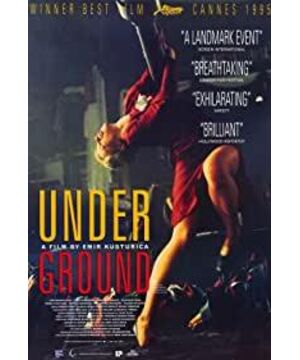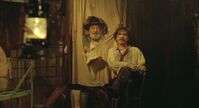Original Author: Sheng Shan
In: "Film Literature", 2017(20)
Kusturica is a director with a very personal style. His films are not only different from Hollywood's narrative style, but also different from European art films' tendency to present philosophical thinking in a calm and restrained manner. Exaggerated and surreal expressions reveal the charm of carnival narratives. But this carnival is not superficial and meaningless, but is full of sharp realpolitical metaphors at a deeper level. "Underground" is Kusturica's first work after returning to Belgrade from the United States. Perhaps it was his life experience in a foreign land that inspired the director's attention to the history of his hometown. The film is very satirical and infectious. Implies a profound reflection on history. Although this country has disappeared from the map now, the audience can still experience the suffering and grief through the power of images.
"Underground" is often regarded as Kusturica's pinnacle. Although the film has been criticized and questioned for its political leanings, it still won the Palme d'Or in 1995, which may be able to prove that true art The work not only cares about reality, but also transcends the entanglement between reality and politics, and shows its value by virtue of its skillful expression at the artistic level.
1. Deconstruction and Retelling of History "Underground" is an epic film based on the modern history of Yugoslavia for more than fifty years. The Balkan Peninsula in southern Europe, which is full of turmoil and disputes, has not had long-term peace since the 20th century, and Yugoslavia was at the center of the storm. Not only were two world wars involved, but the subsequent civil war and Tito's dictatorship also became more profound. A complex crisis erupted foreshadowing. In the 1980s, ethnic and racial conflicts erupted after Tito's death, which eventually led to Yugoslavia's disintegration. Kusturica not only experienced Tito's reign first-hand, but also tasted the grief of war. During the Bosnian War in the 1990s, his family was disturbed by the war. His father died of a heart attack due to the destruction of his house in Sarajevo. He continued to think deeply about the propositions of state and politics. The love of the motherland and the fear of the future of the motherland are intertwined as two contradictory forces, forming the core meaning of Kusturica's film.
The beginning of "Underground" corresponds to the period when Yugoslavia was occupied by the German fascists in 1941, but the film shows a mockery and deconstruction of history from the very beginning. Here, the protagonist of the film, Ma Gao, drinks and rides with Hei Zai to celebrate his joining the Communist Party, and invites a band to play behind the carriage. This passion and carnival completely conceals the cruelty of the war and the seriousness of the revolution. The impact of the war is sudden, the zoo in the film is a very symbolic place, it represents the discipline of human beings on animal nature, but the bombardment of artillery fire has released all the repressed disturbing forces, implying that the war itself is a The destruction of the kingdom of reason, disorder and chaos have become the main theme of the film, but the original brutal war scene is interspersed with the plot of Hei Zai's release of sexual desire and the scene of Ivan protecting the chimpanzee Song Ni in the zoo, which makes people feel absurd. Therefore, the film's writing of war is reversed from the very beginning. The suffering and terror brought by war are replaced by the desire for life and daily situations. The reason that prompted Hei Zai to take up the gun and go to the battlefield may not be the feelings of home and country in his mouth. , but the artillery fire affects the anger that comes with eating.
Not only war, "Underground" also deconstructs the justice of the revolutionary historical narrative, but uses lust to support the driving force of the revolution.
Blackboy falls in love with the young and beautiful Natalie despite his soon-to-be-born wife, and tries to take her away from the Nazi officers, but is captured by the Germans. Ma Gao, on the other hand, disregarded the danger and entered the enemy camp to rescue Hei Zai. Under the strong search of the German Nazis, Ma Gao had to take everyone to hide in the cellar. Since then, he began to live "underground", and Ma Gao also became underground. The only connection between the people and the ground. Hei Zai's wife unfortunately died in childbirth, leaving behind his son Zufan, and Natalie threw himself into his arms under Ma Gao's sweet words. Both the space scene "Underground" and the character setting of "Natalie" are highly symbolic, they imitate and mock history.
First, the "underground" is a place to shelter people from the pursuit of the Nazis. It represents the protection and hope that the revolutionary forces gave the people in the war-torn era; secondly, the "underground" is closed and deceptive, and it creates a relatively stable environment. However, it is easy to become the object of manipulation. People in the underground world have always been swayed by war and hatred, and they have raised their revolutionary fighting spirit. The blindness brought about by this closedness makes people feel ridiculous and pitiful. In addition, Natalie was seduced by Ma Gao after being snatched from the Nazi officer by Hei Zai. She is a woman who loves vanity and weakness, but she is also the core reason for the struggle, the erotic power symbolized by Natalie. Even beyond the brilliance of the revolution, it is the key to involving the individual in big history.
The film pushes the absurd to the extreme, and it is reflected in Ma Gao's deception to everyone. Four years later, the invaders have been driven out, and Yugoslavia has established a new republic under the leadership of Tito. Ma Gao and Natalie have been credited. Great characters are embraced by the masses. What is shocking is that Ma Gao still maintains the "underground" operation, making people believe that the war is still going on, and making them continue to manufacture the weapons needed by the revolution, but they don't know that these weapons are transported to the ground and then resold by Ma Gao. for personal gain. "Underground"'s criticism of a hypocritical politician like Ma Gao can be said to be intrusive. In fact, Kusturica once again completed the review and criticism of history by rewriting and distorting history. War is indeed an excellent opportunity to mobilize people's emotions. "Underground" organizations meet the needs of wartime. However, after the war, "underground" can still continue to exist in the name of revolution. The paradox is that The forces originally supported by the people in turn become the forces that manipulate their freedom. From a plot level, this can naturally be seen as a man's deception of his friends, family and comrades in arms, but the audience can't help but think of the deception of the people by the state's power machine. So far, "Underground" has described the war and politics of Yugoslavia in a rather dramatic way. The superficial absurdity and inner irony have constructed a full dramatic tension, with a deep sense of historical reflection. Behind the hustle and bustle and carnival are endless loneliness and sadness. The comedy appearance and tragic core of "Underground" are not only an accusation with tears in laughter, but also a profound presentation of historical reflection consciousness.
2. Tragic politics in absurd reality Although "Underground" tries to tell history, it does not reconstruct it in a rational way, but uses an absurd way to implicitly show political intentions. Ma Gao went to great lengths to convince the underground people that the war still existed. When Hei Zai wanted to return to the ground to join the revolution, Ma Gao told him that Tito had asked him not to act for the time being, and hoped that he could play a key role in the final moments of the war. effect. Ma Gao brought a pocket watch to Hei Zai, saying it was a gift from Comrade Tito to him. The black boy holding the pocket watch seemed to immediately feel the brilliance of the leader and began to sing a song in praise of Comrade Tito. The sound reached the ground, and the people on the ground began to sing along unconsciously when they heard the song. The chorus on the ground and underground can be regarded as a political metaphor. The idolatrous worship of the leader eliminates the distinction between the ground and the underground, and everyone is in a state of "underground" spiritually, just as Ma Gao's peeping and Like control, political leaders use ideology to manipulate their own people, perhaps as Marco put it: "Every one of us is lying." If Marco is seen as an underground leader, it is this leader who creates the illusion to maintain the underground The operation of the spectator, the audience can see quite clearly how this manipulation is carried out, in fact, it is very similar to the establishment and existence of a society. However, the construction process of the above world is more subtle in the film. On the ground, a film about Ma Gao and Natalie is being filmed. The purpose of the film is naturally to trace the history of the revolution and achieve the purpose of propaganda. But in fact, it is not so much a retrospective as it is an imagination. Because both the events and the characters are extremely distorted, resulting in an exaggerated comedy effect. However, Kusturica obviously has a deeper intention when designing such a plot. His film itself is also a re-presentation of history and politics, which inevitably incorporates the director's subjective judgment and artistic processing. The image is at most only a dimensions, whose purpose is to stimulate thinking, not to attempt to state facts. "Underground" is indeed a presentation of the history of Yugoslavia, but Kusturica doesn't want his own thinking about the country to be forced on the audience, so he tells a story about making a movie in his film, which is not only a The ridicule and banter are more sober and reflective.
The real history, the history presented in "Underground" and the film made as part of the plot of "Underground" forms a triple progressive relationship, repeating the distance between "history" and "history told." If reality is absurd, then any black-and-white historical telling with clear intentions and logical clues is distorted, and Kusturica's film uses carnival narratives to express that crazy age, and it is also true A refusal to mask the complexities and contradictions of history and politics. It is precisely because the carnival itself carries many profound historical expressions and political reflections, which has caused the internal instability of the carnival, and hidden serious crises under the domination of extreme emotions. In "Underground", the wedding scene is the representative of the carnival. There are two weddings in the movie. The first is the wedding of Hei Zai and Natalie, and the second is Hei Zai's son Jovan's wedding. Rika's wedding scene is loud and crazy, endless wine, flowers, music and dance throw people into the sea of emotions, but the Nazis arrived at the first wedding and arrested the black boy, the second wedding The chimpanzee Song Ni enters the tank and blows up the basement and destroys Ma Gao's meticulously maintained world. The hidden crisis in the carnival is the key force to promote the narrative. The director uses this simple correspondence to complete the insinuation of real politics. Whether it is a state of war or a society under centralized power, irrational emotions are swayed, supporting people The power of action is often so simple that it is both stable and easily destroyed. To a certain extent, people's blindness and irrationality are the emotions and attitudes that politicians need, but no control is an airtight wall, and there will always be some force to break through the airtight "underground" ".
3. The ideal expression: a possibility of utopia. Ma Gao's control of the "underground" has reached the extreme, and even time is controlled by him. In fact, people have been underground for 20 years, but he sent people to adjust the time regularly, making people think that only 15 years have passed. In addition, Ma Gao's use of cameras to spy on people underground is also like a surveillance system in a totalitarian society, which makes people shudder. Underground people live in lies without knowing it, but their beliefs are at least firm. And Natalie, who was next to Ma Gao, was not so lucky. Although she knew the truth, she couldn't reveal the slightest bit, and she had to cooperate with Ma Gao in acting. In fact, Natalie, as a representative of women, is a repressed individual from beginning to end. Whether it is a Nazi officer, Hei Zai or Marco, she is regarded as an object of desire, and no one asks her what she thinks. Natalie, who has been in depression for a long time, is in extreme pain. At the second wedding, she danced frantically not to express joy, but to release her depression. She wanted to tell Hei Zai the truth, but she was caught by horses. bound by high love. In the end, the power to destroy the underground came from the chimpanzee Song Ni, who entered the tank and blasted the basement with a cannonball. Kusturica uses chimpanzees to symbolize forgotten humanity, and all the lies are finally revealed by accident.
After the end of the underground world, the fate of several characters had completely different directions. Ma Gao was immersed in the passion of the revolution, and when he got to the ground, he took the scenes of the movie as real war scenes and started to kill, and marched wildly for the revolution. , but the next morning he was busy shooting planes and left his non-swimming son alone in the water causing him to drown. Ivan went to West Germany by accident to catch up with Song Ni, while Natalie and Ma Gao blew up the entire basement and ran away with the money. Long-term lies and repression are instantly released, and each individual bears unspeakable consequences for this, making it difficult for people to look at the world with normal eyes. Twenty years later, Ivan learned that his brother had lied to him. He wanted to go back to Yugoslavia along the underground tunnel, but was told that there was no Yugoslavia. When he set foot on his homeland, the land was still under continuous artillery fire. Sound, Black Boy became a war leader, but targeted the fascists who no longer existed. Ma Gao was still selling arms, and was beaten to death by Ivan, and then hanged himself to death. Natalie died in the shooting, and Ma Gao jumped into it as if he heard the call of his son in the well. The real world has all ended here, and the tragic fate of death has not spared anyone, but Kusturica used a surreal technique to describe another world after death, where everyone was resurrected in water, Disregarding the past, they swam ashore and started a happy life of singing and dancing. The land under their feet gradually separated into a small island and floated into the water. Obviously, this small island far away in the sound of singing and dancing is the incarnation of an ideal world with only joy and no pain, a utopia that does not exist in reality. Kusturica has given all the beautiful imagination to this utopian world. Perhaps what this island carries is the incarnation of ideal politics. Although the reality is full of war, suffering and deception, there will always be a beautiful world parked in people's homes. heart. [Author's brief introduction] Sheng Shan (1985- ), female, from Jingzhou, Hubei, master, lecturer at the School of Engineering and Technology, Changjiang University. The main research direction: college English teaching and language and literature.
View more about Underground reviews










